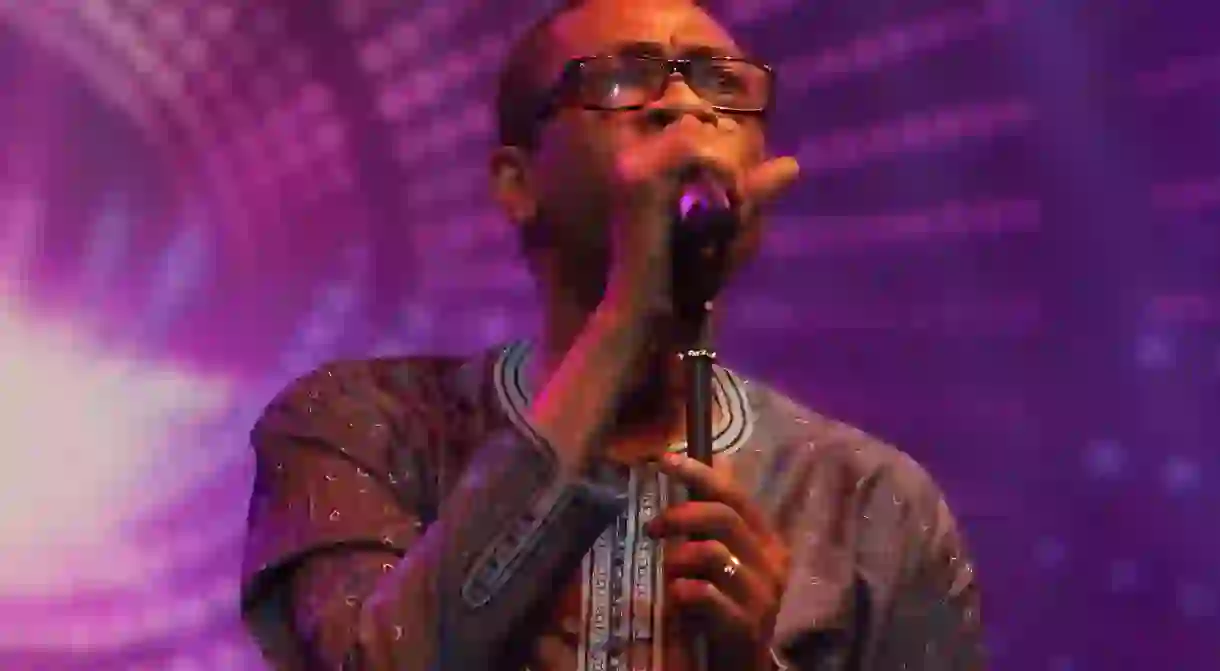Senegal's Youssou N'Dour: 'The Most Famous Singer Alive'

For over 40 years, Youssou N’Dour’s distinctive voice, rhythmic melodies and powerful lyrics have been thrilling audiences in Africa and across the world. N’Dour is frequently referred to as ‘one of the world’s greatest singers’, as well as the ‘most famous singer alive’ in Senegal and Africa. Here’s everything you need to know.

A prodigious talent from an early age
Born among the tightly-packed streets of Medina in central Dakar in 1959, N’Dour was the eldest of eight children. The son of a car mechanic father and traditional ‘griot’ singer mother, the young N’Dour would perform with his mother at religious ceremonies and family celebrations; his astonishing voice stealing the show. With his burgeoning local reputation, N’Dour would wrangle live radio spots and hustle for gigs outside nightclubs. One of which, Thiossane, he now owns.
Soon, one of the most popular nightclub acts in Dakar, the Star Band, took on the precocious 12-year-old, giving him a city-wide platform. When he became the lead of singer of the newly-formed Etoile de Dakar (Star of Dakar) in 1979, this platform would become national. Etoile’s brand of Latin-infused dance music saw them become Senegal’s biggest group, but it would be their split in 1983 that propelled N’Dour from national ‘star’ to international ‘superstar’, as he fronted a new band called Super Etoile de Dakar.

Distinctive style: ‘mbalax’
Super Etoile developed a genre that would change Senegalese music for a generation and help put N’Dour on the map: mbalax. Often spiritual, with its enduring melodies and Caribbean rhythms, mbalax is a highly energetic fusion of Latino rumba with traditional African instruments, marrying the hypnotic beats of African drums, such as the Sabar (bass drum), Djembe (goat-skinned goblet) and Tamas (talking drum), with electric guitars, keyboards and xylophones. Singing predominantly in Wolof, N’Dour employed traditional vocal methods of tassou (Senegalese rap) and bakou (the trilling that accompanies Senegalese wrestling), while his lyrics would celebrate African life, identity and well-being.
N’Dour is to mbalax what Bob Marley is to reggae: a pioneer who changed the genre and whose popularity transcended traditional audiences. He transformed mbalax into chameleonic ensemble music that impersonated any genre from pop, jazz and blues to soul, hip-hop and rock. His art was complex and energetic, but it was N’Dour’s unique vocals that would pull out the chair at music’s top table.

A voice of “liquid gold”
The voice, the voice, the voice. Described by Rolling Stone as “a voice so extraordinary that the history of Africa seems locked inside it,” N’Dour’s vocal chords have to be listened to be believed. Rich, fluid and filled to the brim with passion and personality, N’Dour’s voice encapsulated Super Etoile’s sound and broad appeal; his earlier shows mostly packed with those of African descent.
Labelled the ‘voice of Africa’, it would also crack the anglosphere. In 1984, lead singer of Genesis, Peter Gabriel, travelled to Paris to hear him sing and “was blown away”, comparing N’Dour’s “fluid and expressive voice” with “liquid gold”. He didn’t hesitate in asking N’Dour to support him on his forthcoming world tour.

Collaborations and international renown
N’Dour acknowledges that Gabriel “played a really big part in my success,” claiming that “each night for 100 nights, Peter would introduce me, tell the crowd he was bringing out somebody very special.”
Western crowds, though, weren’t the only ones to fall head over heels for his exuberant style. Promoters were keen to place his infectious rhythms on their bills: co-headlining the 1988 Amnesty International “Human Rights Now!” tour made him a household name. US artists were eager to jump on the bandwagon: in the following decade, he would work with artists across the music spectrum, such as Tracy Chapman, Bruce Springsteen, Paul Simon, Sting, Wyclef Jean and even Bran Van 3000 of Drinkin’ in LA fame.
Then, in 1994, he dueted with Neneh Cherry to create his biggest international hit single, 7 Seconds. Sung in English, French and Wolof, 7 Seconds blended traditional African styles with modern pop. It was named MTV Europe’s Song of the Year in 1995 and has since been played over 58 million times on YouTube.
Influence and current career
N’Dour appreciated the influential power of music, with his songs appealing to people’s morality and responsibility. Since the heady days of 1994, he would become known for his widespread humanitarian activism, as well as a brief stint in Senegalese politics, but music would remain his first love and most powerful mouthpiece; one that he continues to exercise to this day.
In August 2018, for example, N’Dour and the 14-piece Super Etoile dazzled the BBC Proms with a performance full of customary passion and fervour, while Africa’s most famous singer will also be playing along the US East Coast in October 2018.













